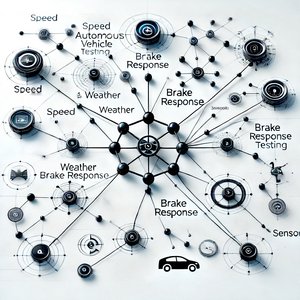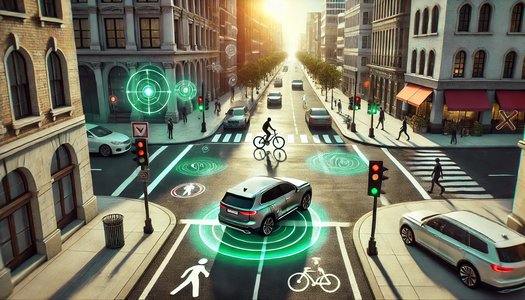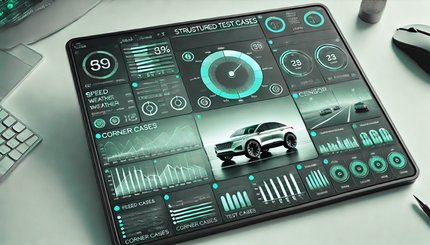Reduction of testing effort through the use of corner cases

Using the generated corner cases as test case data makes it possible to significantly reduce the testing effort:
On the one hand, a single corner case can replace several other value combinations and thus reduce the number of test data combinations to be considered. On the other hand, the corner cases can be prioritized based on the causal model and other additional information from the causal inference, which allows the test to be further focused on the most risky test data combinations.
The solution for scenario-based testing developed in the HolmeS3 project (based on the imbus test management tool TestBench) enables the management and use of causal models and corner cases in the test process. The solution makes it possible and easier to select the appropriate corner cases for a specific driving scenario in a targeted manner and then execute the scenario with these values in the simulator system. In this way, the behavior of the driving function to be tested can be checked and validated under the extreme conditions represented by the corner cases. The result is a complete, comprehensible test documentation that contains all the information required for the safety argumentation.
Application examples and practical implementation of scenario-based testing
Scenario-based testing is widely used in the development and validation of highly automated driving functions. A typical application example is the validation of an emergency brake assist (EBA). In a simple scenario, a vehicle could follow another vehicle on a straight road, with the emergency brake assistant continuously monitoring the speed and distance. The scenario is then run with varying parameters such as different weather conditions, speeds and traffic densities to ensure that the assistant works reliably, even under extreme conditions.
Another example is the testing of automated driving functions in more complex environments, such as a busy intersection in the city center. Here, multiple factors such as pedestrians, traffic lights and sudden obstacles are integrated into the scenario. These realistic test scenarios make it possible to evaluate and optimize the vehicle's behaviour under changing and potentially dangerous conditions.
In practical implementation, a combination of simulations and real driving tests is often used. By using causal models in test management, scenarios can be precisely controlled and the most relevant parameter combinations can be tested to ensure vehicle performance in critical situations. This enables developers to carry out targeted tests that both increase safety and optimize the development effort.
Conclusion: Future-proof safety through innovative test methods
Scenario-based testing in combination with causal modeling and causal inference offers a pioneering method for validating and safeguarding highly automated driving functions. These innovative approaches make it possible to test even complex systems safely and efficiently by precisely simulating real and critical driving situations. The identification and analysis of corner cases and the targeted parameterization of test scenarios not only identify potential risks at an early stage, but also ensure the highest standards of vehicle safety. With these advanced methods, the automotive industry is ideally equipped to meet the challenges of the future and pave the way for safe, autonomous mobility.
imbus: Support for scenario-based testing and beyond
Regardless of whether it is a driverless vehicle or an autonomously operating robot - the people who come into contact with this system must be able to rely on the fact that such an autonomous system fulfills its tasks without errors and is safe.
imbus not only brings extensive expertise in scenario-based testing to the HolmeS3 project, but also decades of experience in software testing and software quality. As a leading provider in quality assurance and test automation, imbus supports companies in developing robust and reliable software solutions. With its own test management tool, the imbus TestBench, the execution of complex test scenarios is optimally controlled, from planning to automated execution.
imbus supports the introduction and integration of the HolmeS3 tool chain into existing development processes and also offers tailor-made solutions for customizing. In this way, imbus ensures that the implementation not only runs smoothly from a technical perspective, but also meets the highest quality standards.
![[Translate to English:] [Translate to English:]](/fileadmin/Repositories/Imbus/Bilder/Forschung/Kuenstliche_Intelligenz/Header_holmes_szenario.jpg)

